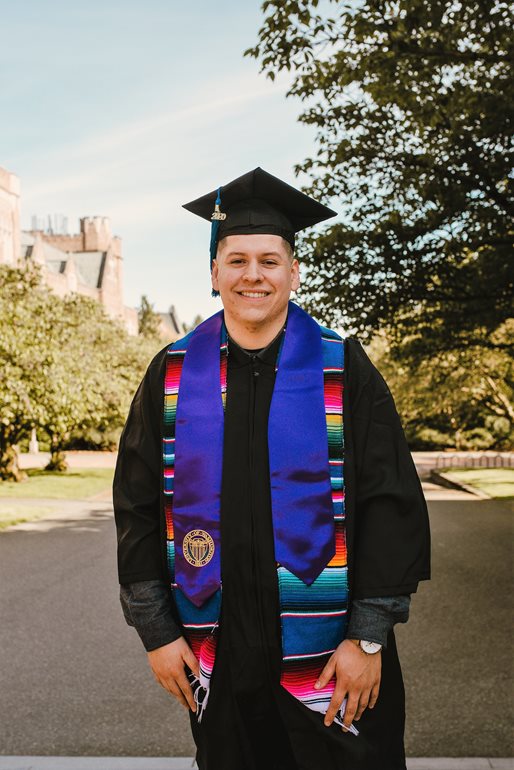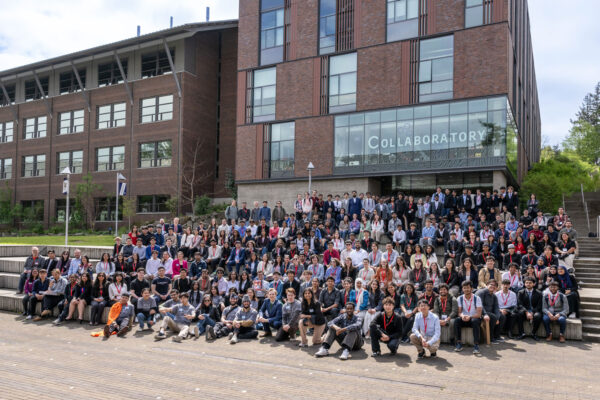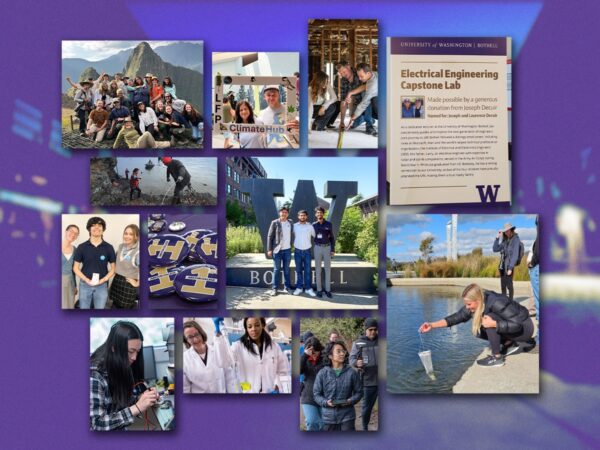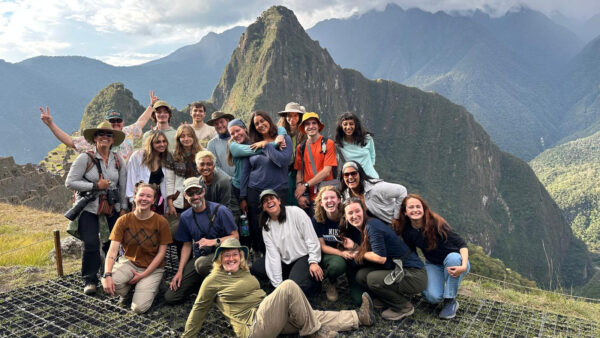
I am originally from Los Angeles and have been living in Auburn, Washington, for approximately 15 years with my parents, brother and sister. I am a first-generation Latino college student. My family and I were thrilled to participate in the UW Bothell Commencement ceremony last month and I will receive my bachelor’s in Health Studies at the end of summer quarter. I aspire to a position as a physician assistant serving the Latino community, specializing in emergency medicine or in family practice where I can play a larger role in patient recovery and treatment. More than anything, I want to honor the sacrifices my parents made for our family.
My role on the frontlines during the COVID-19 pandemic is as a first responder. I have been an emergency medical technician with Tri-Med Ambulance for the past two years. Our duties are to serve all communities in the King County area by providing quality basic life support and critical care transportation. We deploy ambulances strategically to enhance response times and respond to various types of calls ranging from abdominal pain and CPR cases to drug overdoses and motor vehicle accidents. On a day-to-day basis, we respond to 911 emergency calls and non-emergent interfacility transports.
Most of our work comes during our 911 calls. This is where we are dispatched with the requested fire department, police department or other additional agencies that require our services.
During the pandemic, it has felt surreal. Despite my experience with all kinds of situations, I don’t think anything could have prepared me for the physical and mental toll the pandemic would take.
The first encounter I had with COVID-19 was on March 24, with a woman in her 80s who had a chief complaint of respiratory problems and a fever, and had a known history of pneumonia. She was a resident at Life Care Center of Kirkland, which was the epicenter of the disease outbreak in our state.
We had our protocols in place. Our operations manager instructed us on what to do and how to protect ourselves. On that day, we had a unit of three people — the usual two employees and a trainee. Before we contacted the patient, all three of us took a moment to ourselves due to uncertainty of the virus. Full transparency, we didn’t know what to expect so we gave each other a hug and gave ourselves words of encouragement.
We put on our personal protective equipment which included gloves, eyewear, a gown, face shield and an N95 mask. The day was warm, but with the extra anxiety and being wrapped in the extra gear, it felt hot.
We were able to safely transfer the patient from her bed to our stretcher. We took her vitals and treated her the best way we knew how, then we transported her to Evergreen Hospital. The transport was not very long, but it felt like an eternity. After we transferred care to the nurse, our job was completed and the decontamination process began.
The reality of being this close to the virus didn’t really take on full effect until the end of our shift, which was around 8:00. When we got back to our headquarters, paranoia and fear crept in. Our trainee was a father with a 2-year-old boy. My partner was living with people who were considered high risk, and I was living with my parents and younger siblings. Everyone was right in their own way to be worried about bringing the virus home. We each kept in touch during the night and the following week to see if we would develop any symptoms after the exposure.
Personally, I was scared as hell when I came home that day. Scared not only for myself but for what it would mean to my family. My parents are immigrants. They have no medical coverage and, knowing them, contracting COVID-19 wouldn’t be enough for them to seek help at a hospital due to the fear of the bill. My brother is 14 and my sister is 10. There was no way I was going to put them through the agony. I felt alone. That day, once I was close to home, I called my mother explaining to her what happened at work. I begged her not to have any contact with me because of the possible exposure. Once I got home, I stripped off my contaminated clothes and entered my room through a back door and I self-isolated.
I didn’t see anyone for weeks, and it took its toll. Fortunately, I never developed any symptoms, and could see my family once again after weeks of self-isolation.
Fast forward to today, a few months into the pandemic. The stress is not the same as in the beginning, when so much was uncertain and everywhere I turned the news was about the increase in COVID-19 cases and related deaths. It is still all that, but as many have, I’ve adjusted to the new norm as a first responder and have learned to manage my fear and anxiety. I stay updated on the status of the COVID-19 patients I interact with, I follow all protocols and procedures, and I have not exhibited any signs or symptoms of COVID-19.
Work has been especially busy. Some of my coworkers have tested positive, leaving extra shifts that need coverage. Many of us who were not infected have had to work long hours since the outbreak began. The longest shift I’ve worked was 48 hours with one day break, followed by three days of 13-hour shifts.
My experience has been complex. I like to know things are under control, however, COVID-19 stripped me of that feeling. I have always acknowledged the inherent risk of my job, from needle sticks to accidental exposures to violent patients. I understand these risks and, in some ways, can mentally prepare for these challenges and understand the potential outcomes.
It was hard working during the pandemic at first because I had to bottle up my emotions about how I was feeling. I couldn’t express myself to my family because they didn’t know what I was going through. When I tried to tell them, they would get frustrated with themselves because they didn’t know how to respond. I’m grateful for a support group that was created through peers who shared my experiences. The staff at UW Bothell have been understanding, caring and compassionate.
Working and juggling school was not easy. My schedule usually focused on school during the week and work during the weekend plus sometimes working night shifts after class. I took my laptop to work because I’d fallen behind on readings or homework. I would run ideas by my coworkers and ask them for constructive criticism.
I didn’t have a social life. I kept everyone at a distance. My days consisted of me, my class assignments and my work.
What kept me going? It’s tough to say, but a lot has to do with how I was raised. I’ve always put the needs of others ahead of my own, just as my parents did. I’m like them. My mother did not like it when I worked because of her fear of the virus. Bless her soul, but I always told her, “If I don’t do it, if I don’t work, then who will? People need us, Mom, and I need to be there for them. I’ll be okay.”
I have three brothers and three sisters. My older siblings didn’t finish high school and my parents didn’t finish middle school. I keep going for them and always will — to show my younger brother and sister that finishing college is possible. From coming with nothing to the U.S. to giving me everything I need to succeed, I just want to make my parents proud.
~ Oscar
Oscar Ochoa will receive his bachelor’s in Health Studies from UW Bothell at the end of summer quarter. He works as an emergency medical technician and will continue to serve as a first responder until, with additional schooling, he becomes a physician assistant serving the Latino community.


